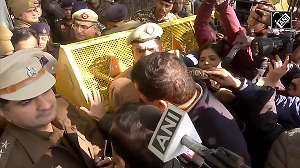This time, Lantos, a member of the powerful International Relations Committee in the US House of Representatives, hopes his message has been heard "loud and clear" -- that if India continues its close relationship with Iran, it would not just jeopardise the India-US nuclear accord but the India-US relationship as a whole.
Interestingly, Lantos is a big supporter of the India-United States civilian nuclear agreement and has pledged to lead the charge in the US Congress for approval of the deal.
Indian foreign minister 'dense': US Congressman
Lynne Weil, Lantos' spokesperson, told Rediff India Abroad that her boss has made no bones about his strong disapproval about India's relations with Iran, but said he saw no necessity to insert any specific words to this effect in the legislation on the India-US nuclear deal he has authored with US Congressman Henry Hyde, chairman of the International Relations Committee, which will be introduced on Tuesday, June 27.
"I am not sure it would make sense to include it in the legislation," Weil said. "The idea is to signal to the Indian government that we prefer to see this behaviour rather than enshrining it in the legislation."
"What he (Lantos) is doing is signaling to the Indian leadership that this is a matter of concern not just to him but to other members," she added.
Was there anything in the Hyde-Lantos legislation that could affect the India-nuclear deal after it is ratified by the US Congress and should India continue its relationship with Iran? Weil acknowledged there was no trigger mechanism that could do that.
"I suppose once the legislation is passed, it is passed," she conceded, and the transfer of nuclear technology and nuclear fuel could be provided to India.
But Weil asserted that "the reason that these concerns are being raised now is because there is still a long way to go before the agreement itself is completed. There is plenty of time to ensure that the message is clear to the leadership in India that this is a matter of grave concern for the US Congress."
The Hyde/Lantos legislation also calls on the Bush administration to 'secure India's full participation in United States' efforts to dissuade, isolate, and, if necessary, sanction and contain Iran's efforts to acquire a nuclear weapons capability, the capability to produce other weapons of mass destruction, and the means to deliver such weapons.'
Last week, Lantos, speaking at an event in Washington, DC, to promote the passage of the nuclear deal, noted that 'huge countries, which are democracies, cannot control all irresponsible statements. So there probably will be irresponsible statements from the American side that will be blown up out of proportion in the Indian press.'
He acknowledged that by the same token, there would also be irresponsible statements from the Indian side which will give ammunition to those in the United States, in the US Congress and outside the US Congress, who would like to torpedo this agreement.
But Lantos argued that 'there is no justification for governmental actions which reflect a bygone period of dramatically less good relations than the ones we enjoy today. So let me mention a specific item which is of considerable concern to me. I hope it will be of concern to my Indian friends and I hope they will be able to deal with this in the future.'
He then went on to recall that 'some of us in this room are old enough to have lived through the Cold War and we have understood the position of the so-called Non-Aligned Movement.'
'That the Non-Aligned Movement of 117 countries is still alive and I don't know what they are non-aligned about? Are they non-aligned about civilisation and terrorism? Are they non-aligned about political democracies and one-party dictatorships and police States because from a vantage point of my small shop it is very difficult to see what 117 countries -- and I won't list them -- have in common with the great democratic State in India in 2006,' the US Congressman said.
He then slammed the recent NAM meeting in Malaysia which he said, 'issued pronouncements on our attempts' to deal with the military nuclear ambitions of Iran.
Lantos, a survivor of the Holocaust, noted that 'this is a very negative phenomenon and I earnestly hope that there will be a great deal of care taken by our Indian friends if they want this proposal to get through Congress and become a reality.'
He declared that 'India is a great country, a powerful and growing economy and a political democracy and there are few things which are as salutary on the global scene than the growing relationship between the United States and India and the nuclear agreement,' and described the deal as 'the most significant political move we have seen in building in a long time.'
But he reiterated his warning, saying, 'This plan will become reality if on the American side we don't place unreasonable burden on our Indian friends because there are some proposals that will be put forward which are deal breakers and I am determined to fight deal-breakers, but I am equally concerned in telling my Indian friends that there can be deal breakers on the Indian side and one of the deal breakers will be the blanket endorsement of the Non-Aligned Movement's statements concerning Iran.'
'That would be a deal breaker,' Lantos said, 'and I hope there will be a very careful avoidance of such matters as we seen in recent days.'






 © 2025 Rediff.com -
© 2025 Rediff.com -